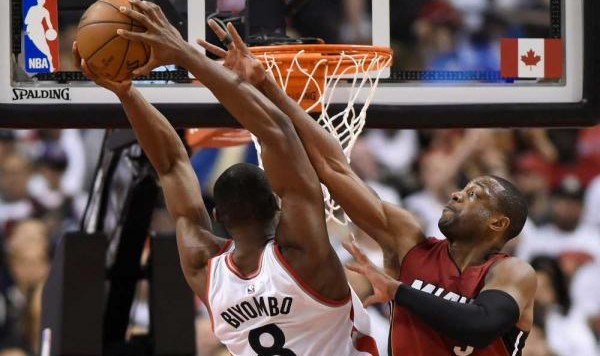The Toronto Raptors spent much of the past month — much of two fortnight-long series against the Indiana Pacers and Miami Heat — fumbling, bumbling and stumbling.
They watched DeMar DeRozan shoot them out of games in their losses, and into more precarious positions in their wins. The erosion of DeRozan’s game, relative to the regular season, should be enough to convince the Raptors to part with him in the offseason, making room for a different piece which could give the franchise more upside.
The Raptors watched Game 1s in each of their first two playoff series turn into nerve-addled clunkers. Toronto fell behind Miami by seven points inside the final five minutes of Game 2. The Raptors also fell behind Indiana by 13 points after three quarters in a 2-2 Game 5. Once in each series, Toronto — though never in a bad position in an actual elimination game — stared death in the face. A loss in Game 2 to the Heat, or in Game 5 to the Pacers, would have meant big trouble.
The Terrence Ross Experience.
The Jonas Valanciunas injury.
The Dwane Casey rollercoaster ride, marked by slow responses to series trends.
The Raptors were handicapped by forces outside their control… and players they weren’t entirely able to control. No one would look at the past month of basketball in Canada and say that this snake-bitten franchise produced a high-quality product. It’s been difficult to watch the past four weeks of Toronto basketball as a neutral party; for those invested in the success of the Raptors, these two wrenching seven-game journeys elicited the mixture of emotions which reminds us why we have a love-hate relationship with sports.
Toronto fans were despondent after the Game 1s; giddy and floating on clouds after the Game 5 escape against the Pacers. “We The North” were on edge entering Game 7 against Indiana; proud after the pivotal Game 3 win in Miami; and resigned to the necessity of Game 7 when Game 6 ended against the Heat.
Beating the Pacers felt like an escape.
Beating Miami and a resurgent Dwyane Wade? This felt like achievement, no matter how choppy the seas might have been, no matter how irritating DeRozan’s shot selection or Casey’s coaching might have been.
Just ask Bismack Biyombo, whose size destroyed the Heat’s small-ball lineup in Game 7 on Sunday, becoming — alongside Kyle Lowry’s renaissance — the difference in the series:
Biyombo continues to dominate on the roll. Wade gonna be a Crying Jordan meme soon… https://t.co/emahXTDCoj
— BBALLBREAKDOWN (@bballbreakdown) May 15, 2016
Sometimes, the goalposts do indeed shift based on circumstances. What might have seemed a reasonable goal two months ago becomes much less (or more) necessary based on internal changes to a roster, or on outside developments from other teams. However, this series against the Heat never really changed the Raptors’ expectations for this season. Because the injury to Jonas Valanciunas was matched by the injury to Hassan Whiteside, this aesthetically uneven slog between Canada and South Florida remained fundamentally even as a matter of competition.
The upshot of the closeness of this series? Toronto didn’t have to offer any style points or shining dimensions of elegance; the Raptors simply needed to check that box and make the first conference final in franchise history, which was the obvious goal of this season all along.
That point never, ever changed, and so as hard as it was to watch the Raptors — against the Heat, and for much of the past month — the aesthetics of the journey really don’t matter within the context of this season.
Much as the Hawks gave the city of Atlanta its first conference final a year ago, the Raptors have given Toronto sports fans an escape from suffering and a rare taste of sunshine. A first-ever trip to the Eastern Conference Finals against the Cleveland Cavaliers cements the reality that the Raptors have forged the most successful season in their history.
This would have been a memorable season without a victory over the Heat on Sunday in Game 7. This would have been an historic campaign even without a survival act in the face of a reborn Wade, whose three-point shooting was a revelation over the past two weeks. This would have been a season the Raptors could still build on had they not prevailed against a Miami team with more postseason experience…
… but it wouldn’t have felt satisfying, and everyone in Toronto knew it.
The Raptors will hear all week that they have no chance against the Cavs and LeBron James. They will hear in the offseason how ugly their playoff run was. They will hear how weak the Eastern Conference turned out to be this season (again).
All those claims contain a certain degree of truth, but when a team goes deeper in the playoffs than it’s ever gone before, a city — not to mention a fan base and that band of players and coaches in the locker room — doesn’t need to care at all. It shouldn’t.
The Toronto Raptors are in the conference finals. They’ve completed the journey the Atlanta Hawks produced a year ago… and which the Los Angeles Clippers have yet to make.
Canada no longer has to wonder if its NBA team will ever take that next step.
Defeating the Cavs? That’s another conversation for another day. For now — for this season — the Toronto Raptors can call themselves something they’ve rarely been able to call themselves over the course of two very difficult decades: a success.
In 2018, this kind of season won’t carry the same kind of resonance or transformative power. In 2016, it’s more than enough for a franchise which needed to get this far in the NBA playoffs, style points be damned.

